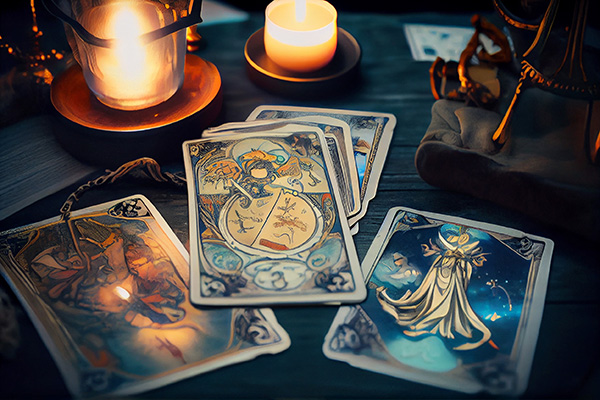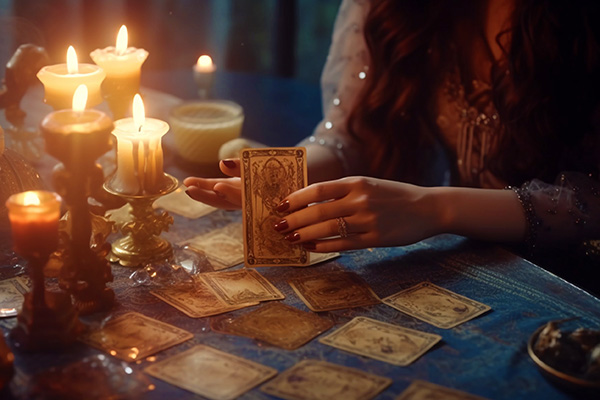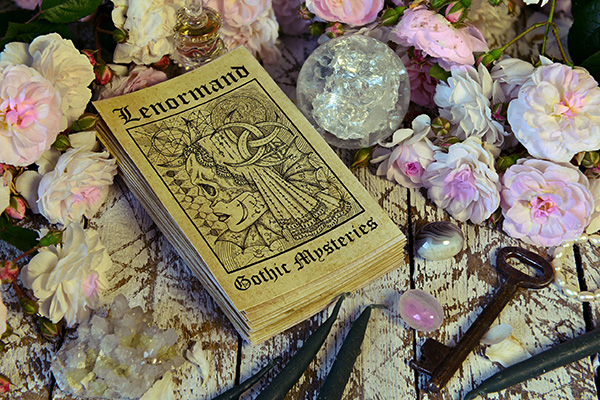Uncover the Enigmatic and Ethereal Wisdom Revealed by the Tarot
 The Tarot is a tool steeped in mystery, symbolism, and powerful energy that assists in uncovering the profound significance behind the daily occurrences in our lives and the Spirit’s influence on our earthly journey.
The Tarot is a tool steeped in mystery, symbolism, and powerful energy that assists in uncovering the profound significance behind the daily occurrences in our lives and the Spirit’s influence on our earthly journey.
This divination instrument provides insight during times of uncertainty or confusion, acting as an ethereal link between our tangible existence and the unseen spiritual dimensions.
The cards possess their unique energy and high vibrations, which Spirit utilizes to relay guidance, motivation, wisdom, and cautionary messages.
Each Tarot reader brings their own spiritual gifts and psychic talents, which lead to the development of a unique reading style over time.
In my personal readings, I’ve observed that Spirit frequently aims to highlight aspects of our lives that may need transformation or healing to cultivate the most favorable future outcomes. This might involve shifting one’s viewpoint, the necessity to release, or at times, simply accepting situations as they stand.
Ultimately, I perceive that Spirit employs the Tarot to help us break free from stagnation and restore our flow. Being in harmony with this flow, we harmoniously co-create with the Universe rather than creating barriers. Only then do we truly progress toward our highest good and the realization of our fullest potential.
The Tarot opens a channel for communication with our guides and higher self, through which we can acquire profound insights regarding our soul lessons and the mystical occurrences in our lives.
Divination represents a pursuit to gain deeper insight into the past, present, and future. In essence, Tarot readings aim to enhance our self-awareness and illuminate how we can lead more fulfilling lives in the future ~ Theresa Francis-Cheung
From the viewpoint of our physical ‘self’ and human ego, we often struggle to perceive situations accurately. However, our higher self comprehends the deeper meanings and intentions, guiding us toward a more joyful, tranquil, and fulfilling life.
We can exhibit significant resistance when unwelcome events disrupt our lives. Generally, during challenging times, we become ensnared in the drama, responding from an emotionally charged state. In these moments of tribulation, the Tarot can aid in stepping back, allowing for a broader perspective and receiving direct guidance from Spirit.
I can assure you that none of the obstacles encountered in your life are intended to harm you. While they may indeed be excruciating and traumatic, Spirit only presents us with situations intended to challenge us, providing opportunities for growth and learning. This empowers us, as we can consciously choose how to react to life’s events and whether or not we will intentionally integrate the lessons meant for our journey.
Have you noticed recurring challenges or problems in your life? Perhaps you’ve encountered a series of destructive relationships, or find yourself perpetually ensnared in unfulfilling careers? Or despite your hard work, are you constantly struggling financially? Maybe it’s time to reflect on why these patterns persist?
Rest assured, Spirit presents these repeating circumstances for your learning, healing, expansion, and fortification. If you are uncertain about the reasoning or method, consulting the Tarot can provide valuable insights. These recurring experiences often serve as mirrors for the areas where a shift in perspective or greater awareness is necessary. They give us the chance to explore different approaches each time by introducing these familiar themes.
This is often where the true magic lies. Once you experience those moments when everything suddenly falls into place, it’s simply extraordinary! During these instances, we feel a significant surge in our own vibrational energy; when we elevate our vibration, the Truth resonates deeply within our hearts.
From my perspective, Spirit is consistently guiding us toward deeper love and compassion. Initially, you may not grasp the reasons for certain events, and the impact may remain unclear. Acceptance of this uncertainty is crucial, along with the trust that the Universe operates within divine order.
Keep in mind that the Tarot is a revered and sacred tool – its misuse is a transgression within and a folly without. It is designed for purposes much nobler than predicting the meeting between a tall dark man and an affluent widow ~ Jack Parsons
This doesn’t imply that we should merely sit back and let life unfold without involvement. It signifies that we do not hold complete dominion. We possess free will, yet every other soul engaged in co-creation also has their own. Our true strength lies in how we respond to and navigate through life’s circumstances, which also highlights our lessons. Since we can’t govern the free will of others, our focus should center on ourselves and how we interact within this miraculous Universe.
The Tarot can act as a powerful means of uncovering the areas of growth we need to address. For instance, Spirit may indicate a shift in perspective is necessary, such as confronting or accepting challenging aspects of your romantic relationships, among others. The Tarot often reveals those less pleasurable truths, which we must acknowledge to make more viable and informed choices.
Conversely, Spirit also provides encouragement during our moments of success! It illustrates ways to cultivate areas in our lives that already bring happiness and fulfillment. It inspires us to take chances in pursuit of our aspirations and reminds us of the blessings we contribute to others’ lives.
Additionally, it’s vital to recognize that Spirit will never intervene with our choices. Through Tarot consultations, we can achieve enhanced clarity and understanding regarding our choices, yet our free will remains sacred. The Tarot offers insights rather than commands, presenting suggestions and guidance instead. By refining our viewpoint and deepening compassion for others, we learn to engage with life wholeheartedly. Only within this space can we truly appreciate the majestic beauty of Source.
The situations and events that occur in our lives can either be viewed at surface level as struggles to endure or embraced as opportunities for growth and deeper insight. When faced with significant life challenges, instead of bemoaning the difficulty, ask yourself: what lesson is present? What am I currently overlooking? And if you’re having trouble finding the answer alone, the Tarot can serve as an invaluable resource to uncover the underlying truth.
The bridge formed by the Tarot between our day-to-day experiences and the intricate workings of Spirit grants us a mystical glimpse into the everyday wonders—the extraordinary, awe-inspiring, perfect Universe, and its influence on our lives. The Universe consistently presents us with precisely what we need to fulfill our dreams. What could possibly be more enchanting than that?
|
Regarded as The Psychic’s Psychic, since 1998, Isadora has provided readings for thousands around the globe, with a notable clientele that includes individuals from the Obama administration, Fortune 500 CEOs, and renowned figures in Hollywood. Her remarkable (Gemini) accuracy is simply remarkable, enabling her to perceive individuals on the Soul Level and respond precisely to inquiries spanning various topics, including relationships, career choices, and past lives—everything that demands clear answers and insightful clarity. She identifies hidden patterns influencing your current circumstances, equipping you with information to positively alter your future. If you’re seeking a reading from this empathetic, straightforward, laser-focused, and committed Psychic, you can find Isadora at PsychicAccess.com. |
Tarot cards have long been linked with mysticism and spirituality, unveiling insights about the past, present, and future. For centuries, people have been enchanted by these ancient cards, and their continued use as a divination tool persists. Regardless of whether you hold skepticism or belief, delving into the mystical and spiritual insights that Tarot offers can lead to a captivating exploration.
The Tarot deck comprises 78 cards, categorized into two principal groups: the Major Arcana and the Minor Arcana. The Major Arcana contains 22 cards, each symbolizing significant life lessons or archetypes. These cards are often perceived as keys to reveal the deeper mysteries within the Tarot. Conversely, the Minor Arcana is made up of 56 cards, separated into four suits: Wands, Cups, Swords, and Pentacles. These cards embody the everyday dimensions of life, providing practical guidance.
One of Tarot’s most intriguing characteristics is its ability to connect with our intuition and subconscious. By shuffling the cards and laying them out in a spread, we tap into our inner wisdom. The images and symbols depicted on the cards act as reflections of our thoughts, emotions, and aspirations. Through the Tarot, we can achieve a more profound comprehension of ourselves and our environment.
Every card in the Tarot deck possesses its distinct meaning and symbolism. For instance, the Fool card signifies fresh starts and taking risks, whereas the Death card represents transformation and renewal. By studying individual card meanings and their interrelations, we can gain valuable insights into various aspects of our lives, such as relationships, employment, and personal development.
Tarot readings can be conducted by professional readers or individuals themselves. The Celtic Cross is one of the most prevalent spreads, granting a comprehensive overview of a situation or inquiry. Other spreads, such as the Three-Card Spread or the Past-Present-Future Spread, provide more focused insights into specific life areas.
It’s crucial to acknowledge that Tarot readings do not deliver fixed predictions of the future. Instead, they provide guidance and possibilities based on prevailing energies and influences surrounding a situation. Tarot functions as a tool for self-examination and personal development, aiding us in making informed choices and navigating life’s challenges.
Beyond personal readings, Tarot can be utilized for meditation and spiritual exploration. Each card can serve as a portal to a different state of consciousness, imparting insights and wisdom from the collective unconscious. By meditating on a specific card or using it as a focal point, we can delve into these deeper realms and receive spiritual insights.
Whether you seek guidance, self-discovery, or a more profound connection to the spiritual domain, the Tarot can be a formidable asset. Its rich symbolism, ancient knowledge, and intuitive nature render it a compelling and enlightening pursuit. So, if you’re intrigued by the mystical and spiritual insights the Tarot offers, why not embark on your own journey of exploration and uncover the secrets the cards have in store for you? Continue reading





